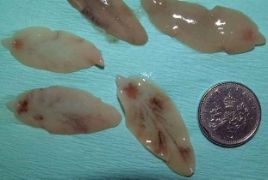- Home
- News & Industry
- Farmers warned to be on the lookout for liver fluke
Farmers warned to be on the lookout for liver fluke

North Wales is a high-risk area for liver fluke this winter, according to the latest NADIS (National Animal Disease Information Service) parasite forecast.
Although there is no effect on meat quality or human health, liver fluke infection in farm animals can have an adverse effect on their performance. Sheep and cows infected with the parasite can lose significant weight. This means that lambs and beef animals could take a lot longer to reach target weight and finish, causing a financial loss to farmers through the increased amount of feed required.
Sheep flocks could experience increased barren rates from infection in the autumn as well as poor retention of lambs during gestation. Pregnant ewes could also experience lambing difficulties, reduced colostrum quality and loss of body condition.
North Wales, along with north-west England and Scotland, have been identified by NADIS as high-risk areas this year, with south Wales considered to be a moderate-high risk area. The forecast is based on high liver fluke prevalence over the summer, which has increased pasture contamination with eggs, and the mild weather experienced towards the end of 2016.
“Liver fluke infection can mean lambs having up to a 30% reduction in daily live weight gain,” said Gwawr Parry, Industry Development Officer at Hybu Cig Cymru – Meat Promotion Wales (HCC). “But there are actions farmers can take to reduce the risk, such as releasing housed livestock onto pasture previously cut for silage which has lower risk of egg contamination.
“Further information and advice is available on the websites of SCOPS (Sustainable Control of Parasites in Sheep) and COWS (Control of Worms Sustainable). Vets can also advise on the best preventative action to take, and on the responsible use of wormers.”

